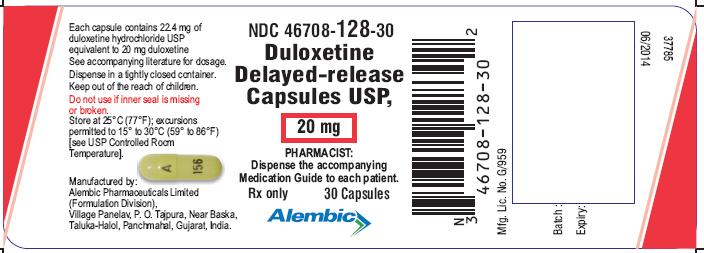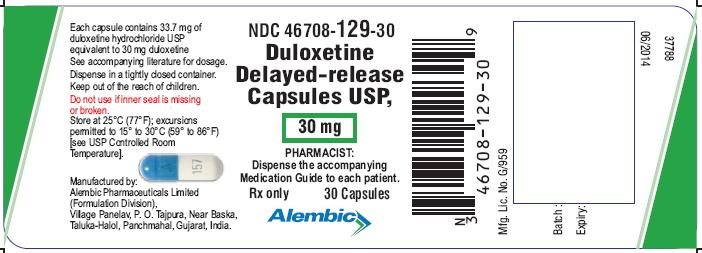
Duloxetine Hydrochloride 20 Mg | Duloxetine Capsule, Delayed Release while Breastfeeding
What is Duloxetine Hydrochloride 20 Mg | Duloxetine Capsule, Delayed Release used for?
Is using Duloxetine Hydrochloride 20 Mg | Duloxetine Capsule, Delayed Release safe or dangerous while breastfeeding?

8.3 Nursing Mothers Duloxetine is excreted into the milk of lactating women. The estimated daily infant dose on a mg/kg basis is approximately 0.14% of the maternal dose. Because the safety of duloxetine in infants is not known, nursing while on duloxetine delayed-release capsules is not recommended. However, if the physician determines that the benefit of duloxetine therapy for the mother outweighs any potential risk to the infant, no dosage adjustment is required as lactation did not influence duloxetine pharmacokinetics. The disposition of duloxetine was studied in 6 lactating women who were at least 12 weeks postpartum. Duloxetine 40 mg twice daily was given for 3.5 days. Like many other drugs, duloxetine is detected in breast milk, and steady state concentrations in breast milk are about one-fourth those in plasma. The amount of duloxetine in breast milk is approximately 7 mcg/day while on 40 mg BID dosing. The excretion of duloxetine metabolites into breast milk was not examined. Because the safety of duloxetine in infants is not known, nursing while on duloxetine delayed-release capsules is not recommended [see Dosage and Administration (2.3)].
Duloxetine Hydrochloride 20 Mg | Duloxetine Capsule, Delayed Release Breastfeeding Analsys
Duloxetine while Breastfeeding
SafeCAS Number: 116539-59-4
It is a reuptake-inhibitor of Serotonin and Norepinephrine. Excreted into breast milk in clinically non-significant amount with no side-effects being observed in breastfed infants from treated mothers. Plasma level in those infants was very low or undetectable. Because there is less experience published than with other antidepressants of the same pharmacological group, it should be preferred the use of an alternative drug that is known to be safer in the neonatal period or prematurity. Galactorrhea has been observed but less frequently than with other antidepressants. Women who use antidepressant medication during pregnancy are in need of more support for breastfeeding since they are at risk for early weaning.
Duloxetine Hydrochloride 20 Mg | Duloxetine Capsule, Delayed Release Breastfeeding Analsys - 2
Duloxetine while Breastfeeding
CAS Number: 116539-58-3
Little published information is available on the use of duloxetine during breastfeeding; however, the dose in milk is low and serum levels were low in two breastfed infants. An alternate drug that has been better studied may be preferred, especially while nursing a newborn or preterm infant. If duloxetine is required by the mother, it is not a reason to discontinue breastfeeding. Monitor the infant for drowsiness, adequate weight gain, and developmental milestones, especially in younger, exclusively breastfed infants and when using combinations of psychotropic drugs. Galactorrhea has been reported in women taking duloxetine.

What should I do if I am breastfeeding mother and I am already exposed to Duloxetine Hydrochloride 20 Mg | Duloxetine Capsule, Delayed Release?
It is always a good idea to keep your healthcare provider or doctor informed about your drug usage during pregnancy and breastfeeding but if you have not informed your doctor about Duloxetine Hydrochloride 20 Mg | Duloxetine Capsule, Delayed Release and have used it then do not panic as Duloxetine Hydrochloride 20 Mg | Duloxetine Capsule, Delayed Release is mostly safe in breastfeeding and should not cause any harm to your baby.
My doctor has prescribed me Duloxetine Hydrochloride 20 Mg | Duloxetine Capsule, Delayed Release, what should I do?
Usage of Duloxetine Hydrochloride 20 Mg | Duloxetine Capsule, Delayed Release is safe for nursing mothers and baby, No worries.
If I am using Duloxetine Hydrochloride 20 Mg | Duloxetine Capsule, Delayed Release, will my baby need extra monitoring?
No
Who can I talk to if I have questions about usage of Duloxetine Hydrochloride 20 Mg | Duloxetine Capsule, Delayed Release in breastfeeding?
US
National Womens Health and Breastfeeding Helpline: 800-994-9662 (TDD 888-220-5446) 9 a.m. and 6 p.m. ET, Monday through Friday
UK
National Breastfeeding Helpline: 0300-100-0212 9.30am to 9.30pm, daily
Association of Breastfeeding Mothers: 0300-330-5453
La Leche League: 0345-120-2918
The Breastfeeding Network supporter line in Bengali and Sylheti: 0300-456-2421
National Childbirth Trust (NCT): 0300-330-0700
Australia
National Breastfeeding Helpline: 1800-686-268 24 hours a day, 7 days a week
Canada
Telehealth Ontario for breastfeeding: 1-866-797-0000 24 hours a day, 7 days a week
